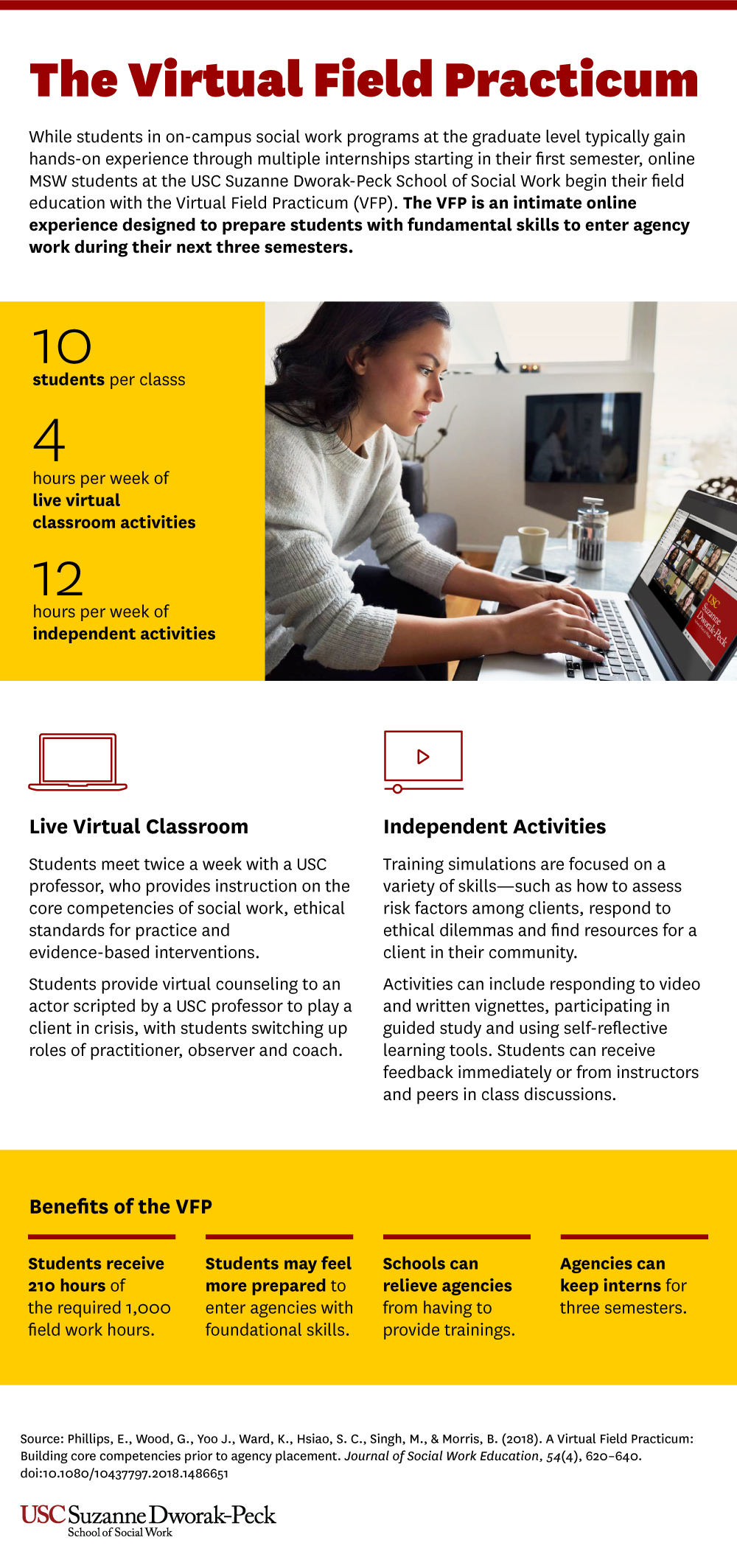How USC’s Virtual Innovation Has Driven the Evolution of Fieldwork in Social Work Education

Social work is a practice-based profession. While learning the profession’s values, standards and approaches are an important component of education for students in this field, being able to apply the skills that are taught in the classroom is key to being an effective social worker. To demonstrate application, about 60% of a student’s educational experience in a Master of Social Work (MSW) program is spent in the field working directly with clients, organizations and communities.
“A good placement site is one that offers a robust training experience,” says Ruth Ann Supranovich, director of field education at the USC Suzanne Dworak-Peck School of Social Work. “They get to watch social workers doing the work and practice it in a safe setting with strong supervisory support. The focus is to see the student as a potential employee, and a future member of the professional workforce.”
When the USC Suzanne Dworak-Peck School of Social Work launched an online MSW program a decade ago, online education looked very different and carried a reputation of being static. But reflecting on the 10-year anniversary of the MSW@USC, the school’s pioneering efforts in this space have shown that students across the country could get an equally robust, engaging and dynamic learning experience in a virtual setting that didn’t sacrifice the signature pedagogy of social work — the field placement.

Introducing the Virtual Field Practicum
A traditional MSW program that students take on campus is four semesters, in which students are required to intern at two separate placement sites, split up by year. Placements begin at the start of the program, so students are immersed in the field component of their education from day one. But this established educational structure posed a dilemma when trying to replicate it in an online setting: How can programs that accept applicants from all across the country find quality placements for every student, including those in rural and remote areas?
To address this challenge, the school created the Virtual Field Practicum (VFP), a 15-week course that students take their first semester in field on foundational practice skills of social work. Each week, students complete four hours of live virtual classroom activities and about 12 hours of independent activities that introduce them to the Council of Social Work Education’s (CSWE) nine core competencies (PDF, 390 KB), the National Association of Social Worker’s (NASW) ethical standards for practice, and three evidenced-based interventions: motivational interviewing, problem-solving therapy and cognitive behavioral therapy. During the VFP, the small group of 10 students in each class works with a simulated client — an actor who is loosely scripted by USC faculty to present challenging social and emotional conditions — to apply the evidence-based interventions and other practice skills such as case management, documentation and diagnosis.
“Our Virtual Field Practicum is state-of-the-art and ensures every student has a standardized experience in their first semester,” Supranovich said. “It can better prepare students so that they are ready to work in agencies that are in their communities because they’ve received this robust initial training. We hear from many agencies that they really appreciate the foundational training that all the students arrive with.”
Beginning the field component of an MSW program with the VFP also allows the field placement team more time to find quality placements for students. And rather than switch placement sites midway through the program, the students stay at one placement site for the duration of the program following the completion of the VFP.
“Some agencies really like the continuity care of having a student for three consecutive semesters,” Supranovich said. “They feel they have more time to train the students.”
Leveraging a Growing Alumni Network for Placements
When students are ready to transition to their field placements, the online program is able to lean on partnerships with many agencies nationwide as well as the alumni network, which has grown the past decade.
“Ten years later, we have alumni all over the U.S. who reach out and want to have students intern with them. We leverage those relationships to find them the best possible placements,” Supranovich said. “There’s probably not anywhere in the U.S. that we don’t have a footprint at this point.”
“Ten years later, we have alumni all over the U.S. who reach out and want to have students intern with them. We leverage those relationships to find them the best possible placements,”
– Ruth Ann Supranovich
As far as which fields attract students the most, Supranovich has seen significant interest in both school social work and military social work, fields the online program covers with specialized learning tracks. Many students have also prioritized placements that address integrated behavioral health, opioid-use and substance-use disorders and transitional age youth.
USC’s program with the Los Angeles County Police Department places interns throughout the city where they can help officers address social issues that affect local communities. Interns help build infrastructure and provide direct intervention, tailoring the program to the specific needs of populations, which can include addressing problems such as gang violence and domestic violence.
Reimagining the Field Site
But much like their work to bring the instructional portion of the MSW experience online, USC has also pioneered bringing the field placement into the virtual realm.
USC’s Telehealth online clinic, which launched in 2012, uses video conferencing to provide face-to-face counseling and psychotherapy for individuals and families. Telehealth also houses a teaching clinic for MSW students in which they complete a six-week training designed and facilitated by Telehealth clinical faculty. The training includes online modules, live training sessions and role-plays to prepare interns to meet with clients independently. The online clinic has served thousands of clients and addresses a range of issues including intimate partner violence, sexual assault and human trafficking.
Having a virtual placement site during the pandemic proved crucial for responding both to the educational needs of students and the mental and emotional needs of clients. Social distancing requirements during the pandemic limited opportunities for traditional placements in students’ communities. At the same time, many people were feeling the combined effects of health challenges associated with COVID-19, job losses resulting from lockdowns and the emotional toll of social unrest.
“COVID’s impact has revealed the value and importance of online programs … and resulted in more openness, reception and acceptance about [telebehavioral health],”
– Caliboso-Soto
“We asked ourselves, what can we do to expand our capacity to serve the community and to take in these MSW students who need to finish their field placement requirement to graduate?” said Sarah Caliboso-Soto, clinical assistant professor for field education and interim clinical director of USC Telehealth, in an article on the expansion of USC’s Telehealth efforts.
In response, Telehealth created the SAFE-T program, bringing in more than 40 new students over the summer to serve individuals in the Los Angeles community impacted by COVID-19. Using the Psychological First Aid/Listen, Protect, Connect model designed to support people in crisis, students assigned to the SAFE-T program provided counseling or case management sessions to 150 individuals referred to USC Telehealth by community or governmental organizations.
“COVID’s impact has revealed the value and importance of online programs … and resulted in more openness, reception and acceptance about [telebehavioral health],” Caliboso-Soto told Social Work Today in an article highlighting the effectiveness of the telebehavioral health (TBH) care model.
Continuing to Evolve the Social Work Profession
Being able to pivot to the changing world was made possible in many ways because of the experience in online education and fieldwork that USC has developed the past decade. And that ability to pivot and adapt is a crucial aspect to the field of social work. In fact, Supranovich said many students learn this lesson as they progress in fieldwork.
“Students certainly come in with some ideas about what they want to do, but they often will change their ideas once they learn more about what social work has to offer,” she said.
Much like the school will continue to learn and evolve over the next decade, Supranovich encourages students to think of themselves as lifelong learners who can use their education in the classroom and the field to cement a strong foundation from which to build.
“Your field experience in your MSW is what gives you the confidence to say, ‘I’ve done this before. I know how to do this. I know that I can improve. And I know that I’m capable,’” she said.
Citation for this content: The MSW@USC, the online Master of Social Work program at the University of Southern California.


